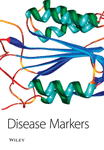Detection of Deafness-Causing Mutations in the Greek Mitochondrial Genome
Abstract
Mitochondrion harbors its own DNA, known as mtDNA, encoding certain essential components of the mitochondrial respiratory chain and protein synthesis apparatus. mtDNA mutations have an impact on cellular ATP production and many of them are undoubtedly a factor that contributes to sensorineural deafness, including both syndromic and non-syndromic forms. Hot spot regions for deafness mutations are the MTRNR1 gene, encoding the 12S rRNA, the MTTS1 gene, encoding the tRNA for Ser(UCN), and the MTTL1 gene, encoding the tRNA for Leu(UUR). We investigated the impact of mtDNA mutations in the Greek hearing impaired population, by testing a cohort of 513 patients suffering from childhood onset prelingual or postlingual, bilateral, sensorineural, syndromic or non-syndromic hearing loss of any degree for six mitochondrial variants previously associated with deafness. Screening involved the MTRNR1 961delT/insC and A1555G mutations, the MTTL1 A3243G mutation, and the MTTS1 A7445G, 7472insC and T7510C mutations. Although two patients were tested positive for the A1555G mutation, we failed to identify any subject carrying the 961delT/insC, A3243G, A7445G, 7472insC, or T7510C mutations. Our findings strongly support our previously raised conclusion that mtDNA mutations are not a major risk factor for sensorineural deafness in the Greek population.




